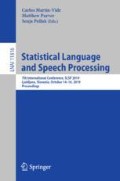Abstract
Hybrid TTS systems generally try to optimise their cost function with the voice provided to generate the best signal. The voice is based on a speech corpus usually designed for a specific purpose. In this paper, we consider that the voice creation is realized through a corpus design step under reduction constraints. During this stage, a recording script is crafted to be optimal for the target TTS engine and its purpose. In this paper, we investigate the impact of sharing information between the corpus design step and the hybrid TTS optimisation step.
We start from a reduced voice optimized for a unit selection system using a CNN-based model. This baseline is compared to a hybrid TTS system that uses, as its target cost, a linguistic embedding built for the recording script design step. This approach is also compared to a standard hybrid TTS system trained only on the voice and so that does not have information about the corpus design process.
Objective measures and perceptual evaluations show how the integration of the corpus design embedding as target cost outperforms a classical hard-coded target cost. However, the feed-forward DNN acoustic model from the standard hybrid TTS system remains the best. This emphasizes the importance of acoustic information in the TTS target cost, which is not directly available before the voice recording.
Access this chapter
Tax calculation will be finalised at checkout
Purchases are for personal use only
References
Hunt, A., Black, A.: Unit selection in a concatenative speech synthesis system using a large speech database. ICASSP 1, 373–376 (1996)
Zen, H., Tokuda, K., Black, A.: Statistical parametric speech synthesis. Speech Commun. 51(11), 1039–1064 (2009)
Zen, H., Senior, A., Schuster, M.: Statistical parametric speech synthesis using deep neural networks. In: ICASSP, pp. 7962–7966 (2013)
King, S., Wihlborg, L., Guo, W.: The Blizzard Challenge 2017. In: Blizzard Challenge workshop (2017)
Fan, Y., Qian, Y., Xie, F., Soong, F.: TTS synthesis with bidirectional LSTM based recurrent neural networks, In: Interspeech, pp. 1964–1968 (2014)
King, S., Crumlish, J., Martin, A., Wihlborg, L.: The Blizzard Challenge 2018. In: Blizzard Challenge Workshop (2018)
Merritt, T., Clark, R., Wu, Z., Yamagishi, J., King, S.: Deep neural network-guided unit selection synthesis. In: ICASSP, pp. 5145–5149 (2016)
Wan, V., Agiomyrgiannakis, Y., Silen, H., Vit, J.: Google’s next-generation real-time unit-selection synthesizer using sequence-to-sequence LSTM-based auto-encoders. In: Interspeech, pp. 1143–1147 (2017)
Zhou, X., Ling, Z., Zhou, Z., Dai, L.: Learning and modeling unit embeddings for improving HMM-based unit selection speech synthesis. In: Interspeech, pp. 2509–2513 (2018)
Perquin, A., Lecorvé, G., Lolive, D., Amsaleg, L.: Phone-level embeddings for unit selection speech synthesis. In: Dutoit, T., Martín-Vide, C., Pironkov, G. (eds.) SLSP 2018. LNCS (LNAI), vol. 11171, pp. 21–31. Springer, Cham (2018). https://doi.org/10.1007/978-3-030-00810-9_3
Chevelu, J., Lolive, D.: Do not build your TTS training corpus randomly. In: EUSIPCO, pp. 350–354 (2015)
Szklanny, K., Koszuta, S.: Implementation and verification of speech database for unit selection speech synthesis. In: Federated Conference on Computer Science and Information Systems (FedCSIS), pp. 1262–1267 (2017)
Nose, T., Arao, Y., Kobayashi, T., Sugiura, K., Shiga, Y., Ito, A.: Entropy-based sentence selection for speech synthesis using phonetic and prosodic contexts. In: Interspeech, pp. 3491–3495 (2015)
François, H., Boëffard, O.: Design of an optimal continuous speech database for text-to-speech synthesis considered as a set covering problem. In: Interspeech, pp. 829–832 (2001)
Cadic, D., D’Alessandro, C.: Towards optimal TTS corpora. In: LREC, pp. 99–104 (2010)
Isogai, M., Mizuno, H., Mano, K.: Recording script design for corpus-based TTS system based on coverage of various phonetic elements. In: ICASSP, pp. 301–304 (2005)
Barbot, N., Boëffard, O., Chevelu, J., Delhay, A.: Large linguistic corpus reduction with SCP algorithms. Computat. Linguist. 41(3), 355–383 (2015)
Krul, A., Damnati, G., Yvon, F., Moudenc, T.: Corpus design based on the kullback-leibler divergence for text-to-speech synthesis application. In: ICSLP, pp. 2030–2033 (2006)
Krul, A., Damnati, G., Yvon, F., Boidin, C., Moudenc, T.: Approaches for adaptive database reduction for text-to-speech synthesis. In: Interspeech, pp. 2881–2884 (2007)
Cooper, E., Chang, A., Levitan, Y., Hirschberg, J.: Data selection and adaptation for naturalness in HMM-based speech synthesis. In: Interspeech, pp. 357–361 (2016)
Nose, T., Arao, Y., Kobayashi, T., Sugiura, K., Shiga, Y.: Sentence selection based on extended entropy using phonetic and prosodic contexts for statistical parametric speech synthesis. IEEE/ACM Trans. Audio, Speech, Lang. Process. 25(5), 1107–1116 (2017)
Alain, P., Barbot, N., Chevelu, J., Lecorvé G., Simon, C., Tahon, M.: The IRISA text-to-speech system for the blizzard challenge 2017. In: Blizzard Challenge Workshop (2017)
Boeffard, O., Charonnat, L., Le Maguer, S., Lolive, D., Vidal, G.: Towards fully automatic annotation of audio books for TTS. In: LREC, pp. 975–980 (2012)
Chevelu, J., Lolive, D., Le Maguer, S., Guennec, D.: How to compare TTS systems: a new subjective evaluation methodology focused on differences. In: Interspeech (2015)
Lambert, T., Braunschweiler, N., Buchholz, S.: How (not) to select your voice corpus: random selection vs. phonologically balanced. In: SSW6, pp. 264–269 (2007)
Acknowledgements
This study has been realized under the ANR (French National Research Agency) project SynPaFlex ANR-15-CE23-0015 and also funded by the Région Bretagne and the Conseil Départmental des Côtes d’armor.
Author information
Authors and Affiliations
Corresponding author
Editor information
Editors and Affiliations
Rights and permissions
Copyright information
© 2019 Springer Nature Switzerland AG
About this paper
Cite this paper
Shamsi, M., Lolive, D., Barbot, N., Chevelu, J. (2019). Investigating the Relation Between Voice Corpus Design and Hybrid Synthesis Under Reduction Constraint. In: Martín-Vide, C., Purver, M., Pollak, S. (eds) Statistical Language and Speech Processing. SLSP 2019. Lecture Notes in Computer Science(), vol 11816. Springer, Cham. https://doi.org/10.1007/978-3-030-31372-2_14
Download citation
DOI: https://doi.org/10.1007/978-3-030-31372-2_14
Published:
Publisher Name: Springer, Cham
Print ISBN: 978-3-030-31371-5
Online ISBN: 978-3-030-31372-2
eBook Packages: Computer ScienceComputer Science (R0)

